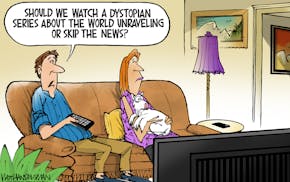Opinion editor's note: Star Tribune Opinion publishes letters from readers online and in print each day. To contribute, click here.
•••
In his Jan. 3 commentary on the U.S. space program, Ron Way offers the ultimate sucker's choice: spend a penny on space exploration, and you've turned your back on the future of the planet and its people. And, by implication, if you direct space spending to the prevention of global warming, you've underpinned a brighter, cleaner future ("Space: The final boondoggle," Opinion Exchange).
But people — and budgets — don't work that way. We can have many priorities and allocate dollars based on their importance to us. And in establishing those priorities, it's most important to understand how much it costs to get what you want.
It's easier for humans to make relative comparisons of large numbers using percentages rather than actual dollar amounts, and doing so enables clearer discussions about priorities. The 2022 NASA budget was $29.2 billion, and federal spending came in at $6.27 trillion, so NASA thus consumes about 0.5% of the total federal budget. For reference, Social Security comes in at 19.4% and defense spending at 12.2%. Wikipedia lists "other" at $193 billion, or just over 3%.
McKinsey, the consulting firm, has published reports estimating that to reach net-zero emissions by 2050 will require additional worldwide expenditures equal to half of global corporate profits and one quarter of total 2020 tax revenue. That's $3.5 trillion in additional annual spending worldwide. In relative terms, that's about half of U.S. federal spending, or 100 times NASA's annual budget.
Regardless of how this challenge is met, it won't be through gutting NASA's budget, or by adding in the budgets of the National Park Service and the Smithsonian to make things go a bit faster. It won't be solved by rearranging priorities within current government budgets, period. Climate change will take additional money, and it should come from those who benefit from our carbon-based economy and can afford to pay. Requiring additional tax revenue from corporations and wealthy individuals is a good place to start.
John Ibele, Minneapolis
•••
"Space: The final boondoggle" neglects to mention several important facts.
First, the advancements made over the years due to our space program have been profound. Without it we wouldn't have GPS, accurate weather prediction, solar cells (critical in fighting climate change) or the ultraviolet filters in sunglasses and cameras.
Other inventions spawned by the space program include CT scans, LED lights, memory foam, freeze-dried food, shock-absorbing materials used in artificial limbs, the computer mouse and portable computers, and a key nutritional ingredient in baby formula.
These add billions to the United States economy in addition to improving human health.
Second, there is a national security concern. The U.S. needs to detect and prevent a hostile nation or terrorist group from deploying space-based weapons or attacking its navigational, communications and surveillance satellites. And while it and other major powers such as Russia and China are signatories of a 1967 treaty that forbids nations from claiming territory in space, it's not hard to think of examples of past treaties that were tossed aside when someone saw a benefit in doing so.
Third, we need raw materials from space. Mining the moon means less mining on Earth. The moon, for example, is a potentially lucrative source of helium-3, which is used for certain MRIs and a possible fuel for nuclear power plants. The moon also is believed to be a potential source of rare earth elements such as europium and tantalum, which are in high demand for use in electronics, solar panels and other advanced gadgetry.
Finally, if things are as dire as Way claims, we will need to move into space to survive. Colonizing the moon, Europa and Mars requires enormous investment.
Do we need to address climate change and hunger on Earth? Absolutely. But taking it from space exploration is not the answer.
There is plenty of waste in government we should focus on instead to fund these humanitarian initiatives. (For example, Californians voted for a high-speed rail project from Los Angeles to San Francisco in 2008. Voters approved $9 billion for the project, and completion was expected by 2020. The project is now in doubt at a cost of $105 billion and counting — an amount that is more than the total cost of the entire Artemis project).
Jim Piga, Mendota Heights
MARIJUANA
Wake up to prohibition's futility
In reading John Hagen's commentary using the view from Prof. Kevin Sabet against legalizing marijuana and all the supporting reader letters, a couple things come to mind ("Follow the science: Don't legalize pot," Opinion Exchange Jan. 3, and "Store it safely, like everything else," Readers Write, Jan. 5). One, almost every negative the writers state also applies to alcohol and other legal drugs. Two, some sound like the old "Reefer Madness" arguments. Three, anyone who wants to buy pot or edibles can get them now with a drive to a legal state or from someone who's made the drive, or from the black market. Why give the tax revenue to other states or profit to illegal, unregulated dealers?
It's time to end this failed prohibition.
Karl Samp, Brainerd, Minn.
•••
The simple answer to a reader's question about why the Minnesota Legislature would even consider the legalization of marijuana: tax dollars. The state of Minnesota has an insatiable hunger for tax money and legalization is simply another source of revenue. We sat on a surplus of $17 billion to spend but that is far from enough to satisfy a Legislature hungry for more. Thoughts like reducing the individual or corporate tax rate or stopping the tax on Social Security never enter the minds of the state legislators.
Bruce Granger, West Concord, Minn.
POLITICS
One party has a plan. The other ...
Wednesday's Star Tribune showed just how stark the difference is between a political group that has plans for the future and is ready to work on them vs. another political group that has no plans for the future and isn't seemingly concerned about accomplishing a thing. Look at the headlines generated by the Minnesota Legislature as the majority party and governor put together a vision for the future and publicly announce their priorities and plans ("Capitol comes back to life as historic session opens," Jan. 4). (That's not to say the minority party in Minnesota hasn't done the same.)
In the meantime, the new party majority in the U.S. House couldn't even agree on finding common ground or on how to begin the legislative session ("Rebellion in GOP paralyzes House," Jan. 5). The members apparently have no plan nor do they care enough as a collective group to get started on anything helpful to their nation or the people they represent. If you voted for Reps. Tom Emmer, Pete Stauber, Michelle Fischbach and Brad Finstad, you have chosen representatives from a group that is not interested in accomplishing anything you were promised. I guess you get what you pay for.
Alan Briesemeister, Delano
•••
The Sunday headline "DFL poised to wield, test new power" made me wince, despite my far-left leanings. Did the DFL intend to shoot warning flares up to the opposition, inflaming Republicans before the upcoming session even began? Or did the Star Tribune zip up the article to provoke? Regardless, it doesn't do anything to end gridlock, as Senate Majority Leader Kari Dziedzic alluded to constituents wanting. Ending gridlock does not mean taking home all the marbles; rather, working across the aisle and respecting those with whom you disagree would be a start.
Yes, the Democrats will get things done, will be better able to address desperately needed issues and, in truth, pass bills that I will applaud. But couldn't we begin the session with a moment of handshaking, listening, looking for something to agree on rather than waving our victory flags in the opposition's faces? I imagine if this were turned around, if Republicans held the three branches and the word "DFL" was replaced with "GOP," my fellow DFLers would shudder and ready themselves for a fight.
Sybil Axner, Minneapolis

BWCA's future likely hinges on election
Saving the dinosaurs: Why there's a future for community newspapers
Readers Write: Gun storage laws, Uber and Lyft, 24/7 businesses, the pipe organ


